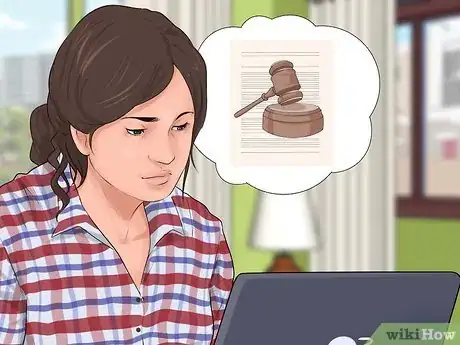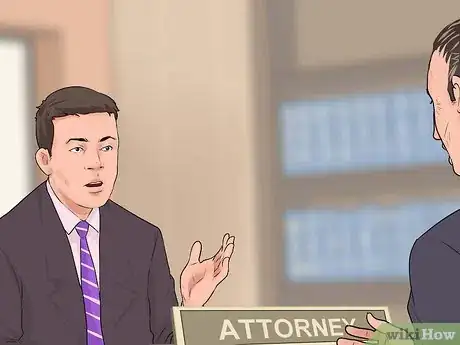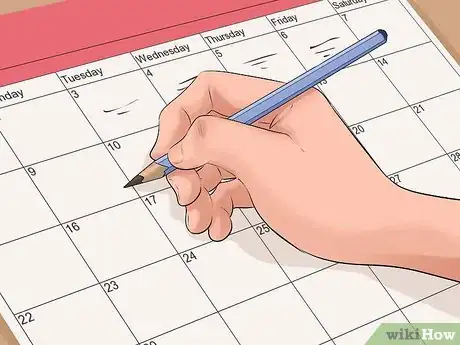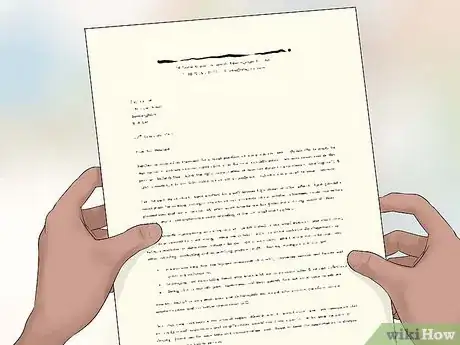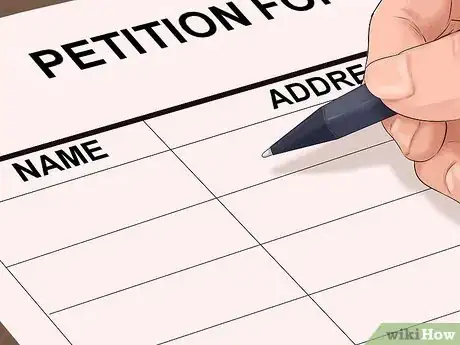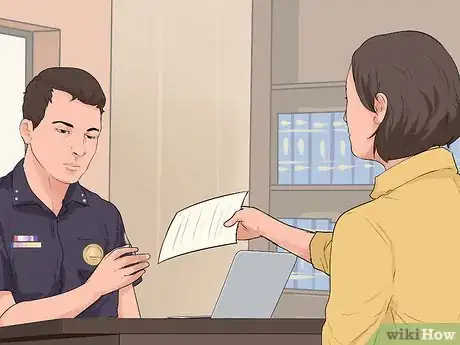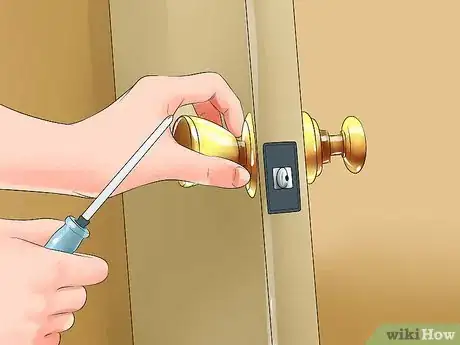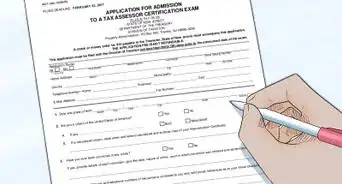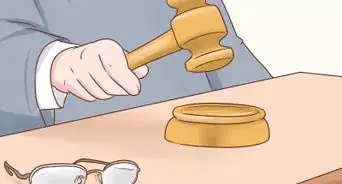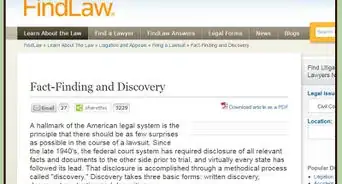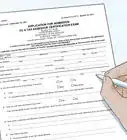This article was co-authored by Clinton M. Sandvick, JD, PhD. Clinton M. Sandvick worked as a civil litigator in California for over 7 years. He received his JD from the University of Wisconsin-Madison in 1998 and his PhD in American History from the University of Oregon in 2013.
There are 13 references cited in this article, which can be found at the bottom of the page.
wikiHow marks an article as reader-approved once it receives enough positive feedback. In this case, 82% of readers who voted found the article helpful, earning it our reader-approved status.
This article has been viewed 255,810 times.
A tenant without a rental agreement is called a “tenant at will.”[1] This type of tenant has few legal protections, and landlords can evict if they follow the procedures established by the state. If a landlord has legal questions, then they should meet with a lawyer.
Steps
Preparing to Evict
-
1Confirm that you have no written lease. Make sure that you didn’t execute a written lease but forget about it. Most state laws provide greater protection to tenants who have rental agreements.
- Check your emails also to see that you didn’t create a rental agreement through email. An agreement can be informal; it does not need to be an extensive written lease. If you are worried that the tenant might try to object to the eviction, then make sure you didn’t accidentally make promises through email.
- Even where a tenant has an oral agreement, the tenant is still considered a “tenant at will.”[2]
-
2Read the state law. Your state law spells out the steps you need to take to evict a tenant, even when the tenant has no rental agreement with you. For example, in Maine, a landlord must provide a “Notice to Quit” in writing.
- State law may also tell you the precise language that you must use when giving notice. For example, if you want to evict someone in Maine because they have not paid their rent, then you need to include the following language:
- “If you pay the amount of rent due as of the date of this notice before this notice expires, then this notice as it applies to rent arrearage is void. After this notice expires, if you pay all rental arrears, all rent due as of the date of payment and any filing fees and service of process fees actually paid by the landlord before the writ of possession issues at the completion of the eviction process, then your tenancy will be reinstated.”[3]
- To find your state law, search the Internet for “your state” and “eviction.” Pay attention to the requirements and follow them to the letter. A tenant can successfully dispute an eviction if you do not give sufficient notice or do not include required language.
Advertisement - State law may also tell you the precise language that you must use when giving notice. For example, if you want to evict someone in Maine because they have not paid their rent, then you need to include the following language:
-
3Meet with a lawyer. If you have legal questions about the eviction, then you should consult with a lawyer. A lawyer can make sure that your Notice to Quit conforms to the requirements of state law. They can also help you file a petition for eviction with a court.
- To find a qualified attorney, you should contact your state bar association. Bar associations are private groups of attorneys. Many of these groups either run attorney referral programs or can point you to county bar associations that run referral programs.
Bringing an Eviction Suit
-
1Give sufficient notice. Your state law will tell you how much notice you must give the tenant. In Maine, you must give the tenant either a 30-day or 7-day “Notice to Quit.” If you give a 30-day notice, then you do not need a reason for the eviction. If you give a 7-day notice, then you will need to state a reason.[4] The eviction cannot occur, however, before the last day for which rent has been paid. Thus, if you accept rent for the month of March, you cannot evict before the last day of March.
-
2Provide notice in writing. You should type up the Notice to Quit and keep a copy for your records. You must also properly serve the notice. Check your state law, which should clarify what are acceptable methods of service. If you fail to serve notice properly, then the Notice to Quit could become ineffective. Generally, you can serve notice in the following ways:[7]
- personally serve on the tenant
- leave the notice with the tenant’s spouse
- mail it to the tenant using first class mail
- have a sheriff or constable personally deliver the notice
-
3Do not forcibly remove the tenant. You cannot forcibly throw someone out of the apartment, even if there is no rental agreement. Instead, you will need to get permission from a court.[8] You need to prepare to file an eviction lawsuit.
- You shouldn’t try to lock out the tenant either. Avoid changing the locks or turning off utilities in the hopes of forcing someone out. You could end up being fined if you do so.[9]
- Gather relevant evidence, such as the date the tenant first moved in, the amount of rent, and the reason why you want to evict him or her.
- You will also need a copy of your Notice to Quit.[10]
-
4File a petition with the court. You will need to complete a petition to evict the tenant. Your courthouse should have a form for you to fill out.[11] Ask the court clerk for the form.
- You will probably have to pay a filing fee, which will vary by court.
- Be sure to serve notice on the tenant.[12] Notice will consist of a copy of the petition and a summons (which you can get from the clerk). Ask the court clerk for acceptable methods of service. Generally, service can be made by someone 18 or older who is not a party to the lawsuit. You may also be able to serve notice by using a private process server or the sheriff.
- You will probably have to pay a fee if you hire someone to serve notice. For example, a private process server can cost $45-75.[13] A sheriff’s fee is usually comparable.
-
5Attend a hearing. If the tenant wants to fight the eviction, then you will need to attend a hearing before a judge. As the landlord, you will go first.[14] Explain to the judge the reason for the eviction and when notice was given. Ask the judge if they want to see your copy of the Notice to Quit.
- The tenant will go next.[15] It is very difficult for a tenant without a rental agreement to successfully dispute an eviction. However, the tenant could argue that you are motivated by discrimination or retaliation.[16]
- The tenant will need to provide evidence that you discriminated on the basis of a protected characteristic (race, gender, age, etc.) A bald accusation will not be enough.
- One way to defend yourself against a charge of discrimination is to point out that you allowed the tenant to rent from you in the first place. If you had a problem with his or her age, religion, race, etc., then you would never have rented to them.
Removing the Tenant from the Premises
-
1Take the order to the sheriff. If you win at the hearing, then you should take the judge’s order to the sheriff’s department. The sheriff will then notify the tenant and tell him or her the date on which law enforcement will show up to evict them.
- You cannot evict the tenant yourself, even after receiving the judge’s order. Instead, you need to let law enforcement handle it.[17]
-
2Change the locks. After the tenant has been evicted, you should change the locks in case the tenant had a copy of the key made. Be sure to wait until the tenant has been evicted before switching the locks.
-
3Check for damage. If the tenant damaged the apartment, then you can bring a suit to recover for the damage. Walk through the apartment and take photographs of any damage. You cannot recover for normal “wear and tear.” Nevertheless, if the tenant cause more serious damage (like a hole in the wall), then you should document it.
- You will first need to apply the tenant’s security deposit (if there was any) to cover the damage. You can then recover any amount that is not covered by the security deposit.[18]
- Before suing, however, you should consider whether the tenant has any money in the bank that you could collect.[19] If you evicted the tenant because they couldn’t pay rent, then it may not be worth your time to pursue a lawsuit.
- For information on how to file a small claims case, see File a Case in Small Claims Court.
References
- ↑ http://www.masslegalhelp.org/housing/private-housing/ch4/tenants-without-leases
- ↑ http://www.masslegalhelp.org/housing/private-housing/ch4/tenants-without-leases
- ↑ http://ptla.org/rights-tenants-evictions#
- ↑ http://ptla.org/rights-tenants-evictions#
- ↑ http://www.nolo.com/legal-encyclopedia/kansas-notice-requirements-terminate-month-month-tenancy.html
- ↑ https://www.mass.gov/guides/tenants-guide-to-eviction
- ↑ http://www.masslegalhelp.org/housing/private-housing/ch13/receiving-proper-notice
- ↑ http://www.masslegalhelp.org/housing/private-housing/ch4/tenants-without-leases
- ↑ https://www.legalzoom.com/articles/how-to-evict-a-tenant-from-a-rental-property
- ↑ http://www.nolo.com/legal-encyclopedia/how-evict-tenant-north-carolina.html
- ↑ http://www.jp.hctx.net/forms/2013%20APPROVED%20FINAL%20RULES%20-%20WEBSITE%20DOWNLOADABLE%20FORMS/EV-Petition%2003-03-2014.pdf
- ↑ https://www.legalzoom.com/articles/how-to-evict-a-tenant-from-a-rental-property
- ↑ http://www.serve-now.com/about-process-serving
- ↑ http://www.nolo.com/legal-encyclopedia/how-evict-tenant-north-carolina.html
- ↑ http://www.nolo.com/legal-encyclopedia/how-evict-tenant-north-carolina.html
- ↑ http://ptla.org/rights-tenants-evictions
- ↑ https://www.legalzoom.com/articles/how-to-evict-a-tenant-from-a-rental-property
- ↑ http://real-estate-law.freeadvice.com/real-estate-law/buy_sell_a_home/lanlord-rights-unpaid-rent-property-damage.htm
- ↑ http://real-estate-law.freeadvice.com/real-estate-law/buy_sell_a_home/lanlord-rights-unpaid-rent-property-damage.htm
About This Article
To evict a tenant without a rental agreement, start by searching online for the eviction laws in your state or country so you don’t break the law. For example, in Maine, you’ll need to provide the tenant with a “Notice to quit” in writing and give them 30 days to vacate the premises. If your tenant refuses to leave the property after the notice period, file a petition to evict them with your local courthouse. You’ll also need to serve your tenant notice of the petition so they know when to attend court. If you win the lawsuit, take the judge’s order to your local police or sheriff’s department so they can evict your tenant for you. For more tips from our Legal co-author, including how to file a lawsuit for any damages your tenant made to your property, read on!

